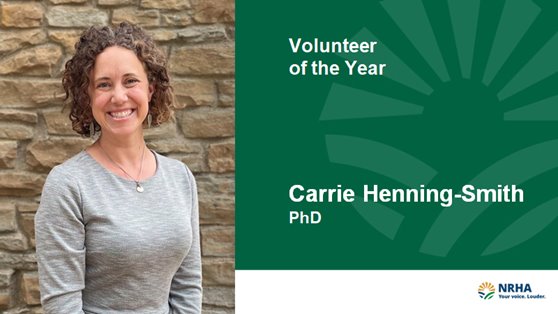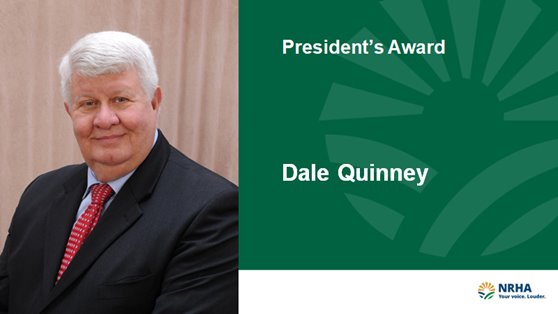Learn about NRHA's 2022 Rural Health Award recipients
This year’s winners have worked tirelessly in their respective communities to ensure that rural Americans receive high-quality health care. This mission has been a particular challenge in these days of the COVID-19 pandemic. In the past 26 months, these dedicated organizations and individuals have forged ahead to provide services at the risk of their own health, and often at the risk of their own lives.
From the impassioned advocacy of a hospital CEO in Michigan to the lifetime commitment to immigrants by a Georgia physician, these recipients have done whatever it takes to provide health care to those in need. This is a slate of experts, including a researcher who helped shape Medicare reimbursement, an educator who developed health policy courses to inspire future leaders, and an Alabama native whose work influenced an entire state’s rural health care culture.
This year we celebrate an organization that provides dental care to low-income families in Minnesota. We honor the efforts of two significant partnerships: One between a Massachusetts teaching hospital and a native American tribe, and the other between an Illinois university and its neighboring hospital.
Lastly, we encourage and support the work of two outstanding students, who will advance rural health in the future. These meaningful endeavors represented by our award recipients serve as models to us all. They challenge us to brighten our corner of the world.
Rebekka Delgado
The NRHA/John Snow Incorporated Student Leadership Award winner is Rebekka Delgado. Let’s find out more about Rebekka’s work with the migrant farming population as a fourth-year medical student at East Tennessee State University.Julia Interrante
Our next award is the NRHA/John Snow Incorporated Student Achievement Award. We’re happy to recognize, Julia Interrante, and her research on rural maternity care access and quality.Katy Backes Kozhimannil, Ph.D.
This year’s Outstanding Educator Award recipient is no stranger to NRHA. Katy Backes Kozhimannil is known for her inspiration and enthusiasm. Let’s hear from Dr. Kozhimannil about her life and work at the University of Minnesota School of Public Health.Curt Mueller, Ph.D.
This year’s Outstanding Researcher Award recipient is Curt Mueller. Dr. Mueller’s efforts as a health care economist and health services researcher have been far reaching. Let’s take a closer look at Curt Mueller.James Ellis Green, M.D.
The Rural Health Practitioner of the Year award is given to one who has so elevated the art of rural health care delivery that his influence has been felt on a multitude of levels. This year’s winner, Dr. James Ellis Green, is a respected physician known for his compassionate care of immigrants throughout the Latinx culture of northeast Georgia. Dr. Green happens to be the brother of former NRHA president, Hilda Heady. In addition to his work as a physician, Dr. Green enjoys car racing and playing in a rock band. In fact, you’ll hear his band in the background of this video. Let’s listen.Northern Dental Access Center
The Outstanding Rural Health Organization award is presented this year to Northern Dental Access Center of Bemidji, Minnesota, where this nonprofit, community clinic provides comprehensive dental care to low-income rural Americans. Let’s explore the different ways in which this organization confronts the day-to-day realities faced by the underserved population.Carrie Henning-Smith, Ph.D.
Each year the staff of NRHA nominates and selects the NRHA Volunteer of the Year. The attributes of this person include a willingness to be of service whenever needed, a commitment to rural health, and active participation in NRHA. In addition, the Volunteer of the Year is one who has been a gracious representative of NRHA in a variety of settings. This year, the NRHA staff has selected as the Volunteer of the Year, Carrie Henning-Smith.
Carrie serves as Assistant Professor at the University of Minnesota, School of Public Health in the Division of Health Policy and Management. Nominated by Gabriela Boscán, Carrie is the Chair of the Journal of Rural Health, and a member of the Health Equity Council. She is a past NRHA Fellow and is always willing to present to the new classes. Dr. Henning-Smith offers presentations on various calls and conferences, and generously shares her research with staff and members.
Carrie is motivated by a mission to move toward health equity for all, with a particular focus on historically marginalized populations, in order to illuminate structural barriers to health and well-being.
Dale Quinney, MPH
As the Executive Director of the Alabama Rural Health Association for 16 years, Dale Quinney has made a difference by using data to deliver powerful messages promoting rural health. His special talent is knowing how to present data to generate the reaction that is needed to enact change.
In 2009 and again in 2013, Dale produced the Selected Health Status Indicator Reports for each of Alabama’s 67 counties. These reports presented measures on more than 90 health status indicators, comparing the county to the state and the nation on each indicator. These reports were used to identify local health issues and obtain additional information for writing more competitive grant applications. He shared the report with local papers, elected officials, and other stakeholders to showcase healthcare as an economic factor.
Dale served as the leader of a team of data specialists to develop the first Community Health Assessment for Alabama, working with the Alabama Department of Public Health and over 300 other organizations. The team determined the ten leading health issues through large surveys, and compiled them into a detailed report which had special emphasis on Alabama’s rural areas.
Dale leveraged data to save the Wedowee Hospital. Randolph County had already lost its largest hospital and the hospital in Wedowee was old and in bad condition. A large medical center in Georgia agreed to staff and furnish a new hospital in Wedowee if the county could provide 20 million to build the facility.
Dale was contacted by a member of the county commission and asked to speak at a public forum which promised to be heated. Polls indicated that the people were not going to pass a 1 cent sales tax to build the hospital since they were already paying a property tax for healthcare. At the public forum, Dale pointed out that Randolph County had the 2nd highest motor vehicle accident death rate, the 3rd highest accidental firearm death rate, and the 2nd highest stroke death rate among all 67 Alabama counties. He noted that these were situations where the victims needed to get to a hospital emergency department as soon as possible.
His remarks, along with additional information he provided to the local newspaper, were given credit for changing public opinion on the proposed tax. It was approved, receiving 84% of the vote.
His colleagues at other state rural health associations have wonderful comments about his work:
Ryan Kelly from Mississippi says, “From the first time that I met Dale Quinney, I could instantly tell that his passion for improving rural health was deeper than just a career. He lived in rural Alabama, dedicated his free time toward improving rural healthcare, and he sincerely wanted the best for all people. It is determination and dedication like this that makes a true difference in the lives and hearts of others. He has inspired me through my journey in rural health, and no doubt has done the same with so many others.”
Tina Elliot from Indiana remarked, “I’ve enjoyed meeting Dale at various National Rural Health Association events, and learn about how he is meeting the needs of rural communities through Operation Save Rural Alabama, an organization he founded. Dale speaks about materials produced in rural areas that are critical to the survival of rural communities that produce economic impacts for everyone. He shares about the lack of healthy population growth and how to meet the healthcare needs in rural Alabama. Dale talks about his involvement with establishing an Area Health Education Center program in Alabama to expand the healthcare workforce and to create opportunities for interprofessional education.”
Beth O'Connor, who as 2022 NRHA President selected Dale, added, "Concerning the state I represent, Virginia, Dale impressed on me the need to convey information to our elected officials regarding everything rural communities do to support the United States as a whole. He helped me understand how rural communities need to stop begging for resources that came from our land and start communicating how rural supports urban."
Dale has received many accolades for his work, including the D.G. Gill Award for making an exceptional contribution to public health in Alabama, and the Ira Myers Award. This is the most prestigious public health award in Alabama and is presented to those making a significant impact on public health in Alabama. Dale is one of only two non-physicians to ever receive the Ira Myers Award.
Dale insists that his most important recognition is his family. He and his wife, Susan, have been married for 46 years. Their children Brent and Leigh, along with their spouses, are carrying on Dale’s legacy by making their own contributions to healthcare in Alabama. Dale and Susan have six grandchildren, including two sets of twins.
Addressing the rural crisis in many states and local communities requires leadership, commitment, and coordination, and Dale Quinney has offered those to rural Alabama, and rural America.2
Jeremiah Hodshire
The Louis Gorin Award for Outstanding Achievement in Rural Health Care is one of the most meaningful awards presented, and recognizes one who has reached out to rural Americans in creative, unselfish and compassionate ways. This year, NRHA is recognizing Jeremiah Hodshire, also known as “J.J.”, who creates long-term sustainability for rural hospitals in Michigan.Healthy Hillsboro
Our first recipient for the Outstanding Rural Health Program is Healthy Hillsboro, a partnership between Hillsboro Area Hospital and Southern Illinois University School of Medicine, Department of Population Science and Policy. By addressing multiple issues at various stages of life, this program is improving a system of care within the community. Let’s have a look.Massachusetts General Hospital Rural Medicine Program
Our second recipient for the Outstanding Rural Health Program is the Massachusetts General Hospital Rural Medicine Program. This involves management of a full-time clinical presence of three physicians serving the Rosebud Sioux Tribe in South Dakota. Let’s learn more.This concludes NRHA's 2022 Rural Health Awards roster. Congratulations to all winners.
